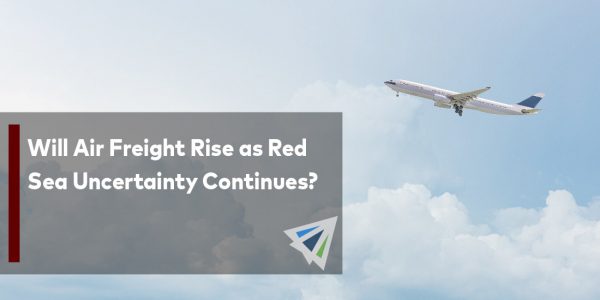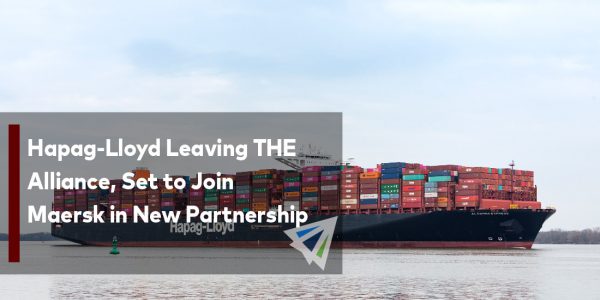Competitive Edge
February 7th, 2024
Stay Current with InterlogUSA
Latest Industry Happenings and Market Updates:

IMPORT: Asia to North America (TPEB)
Recent Developments:
- Lunar New Year begins this Saturday (Feb. 10), posing its usual impacts on international shipping.
- General rate increases (GRIs) are in play for Asia services to all U.S. coasts.
- Surcharges remain imposed on transits through the drought-hit Panama Canal.
- Carrier services remain transiting around Africa to avoid the Suez Canal. Transit times and rates have increased, while more capacity is being absorbed due to service requirements.
Rates: Rates have nearly doubled since late December and have remained high. Longer transits (avoiding the Suez) will increase shipping demand measured in ton-miles (volume multiplied by distance), a factor further applying upward pressure on rates.
Space: Space has tightened due to external supply chain events and pre-Lunar New Year preparations.
Capacity: Longer transits averting the canals will absorb vessel capacity in order to maintain weekly services, however not to an extent where it would be a critical crunch.
Equipment: There are no outstanding equipment deficits or bottlenecks.
TIPS:
- If your orders (shipments) can wait to move after Lunar New Year, strongly consider holding off until then. Rates will likely fall following the holiday.
- Hold your logistics partners accountable for frequent updates regarding current market conditions and routing impacts.
- Be flexible and adaptive to alternative service options, especially as it relates to potential savings on cost or transit.
IMPORT: Europe to North America (TAWB)
Rates: Rates have fallen since early January. Shipper demand remains far too low for carriers to sustainably lift prices.
Space: Space is open.
Capacity: Capacity remains in excess. Carriers are partially curbing this by reducing the size of vessels operating on transatlantic lanes. There remain no significant blank sailing programs though.
Equipment: Availability on both origin and destination sides, unless advised otherwise.
TIPS:
- Book at least three weeks prior to the ready date.
- Communicate with your logistics partners to ensure that you’re up to speed on the EU ETS program and its evolving impacts on transatlantic trade.
EXPORT: North America to Asia
Rates: Rates are low and level.
Capacity: Space remains open, particularly from West Coast ports, however carriers remain curbing capacity via blank sailings and slow steaming as U.S. import demand remains challenged.
Equipment: Barge services in China will be temporarily suspended in early February due to this year’s Lunar New Year holiday.
TIPS:
- Insufficient communication with sailing schedules can lead to higher detention and demurrage fees as well as higher trucking and storage costs. Ensure your logistics partners are not keeping you and your cargo in the dark.
Freight News
Dockworkers at DP World Terminals in Australia Reach Tentative Agreement
After four months of industrial action, DP World Terminals and the dockworkers (Maritime Union of Australia) have reached a tentative agreement.
The MUA confirmed that this tentative deal marks “the end of all industrial actions.” The industrial actions were going on since October 2023.
As the JOC reports, the tentative four-year deal will have the dockworkers receiving a 23% pay raise over four years – which has an 8% increase in the first years of the deal.
The tentative deal also includes enhanced safety measures, fatigue management measures guarantees of job security and work-life balance for employees.
Norfolk Southern Plans to Cut/Re-Route Traffic on Some Intermodal Lanes
Norfolk Southern “strongly believes places such as Charlotte, Atlanta, and Florida are going to outpace growth,” which is shifting their focus on providing the best service solution to these areas of growth, Shawn Tureman, VP of Intermodal and Automotive for NS, said in an interview.
The plan is to eliminate domestic and international intermodal service – on February 19th – to Birmingham, Alabama; and New Orleans, due to low volumes transiting those cities – NS tells the JOC in an interview.
They also plan to re-route traffic between Allentown, Pennsylvania; and Memphis, Kansas City, and St. Louis, and between Elizabeth, New Jersey; and Toledo, Ohio.
Watch January's Webinar!
TOPICS: The State of Global Trade
– Updates on the Red Sea/Suez Canal and the Panama Canal
– Rates/Capacity, routing options, and how all, or any, of this impacts you.
Sign Up For Our February Webinar!
Our next webinar is Wednesday, February 21st, at 10am CST!
We will be announcing topics in the next couple of weeks.
(Please note: If you do not see your webinar invite after you register, please make sure to check your junk/spam folders. Reach out if you have any questions at support@interlogusa.com)
If you have any topic suggestions or questions for our experts.. let us know!
Interlog  Insights
Insights
In last week’s insights, we discussed the U.S. East Coast and if ports have seen any congestion due to ships diverting from the Red Sea. Plus, we talk about Mexico’s Interoceanic Corridor and if it could eventually compete with the Panama Canal.
If you’d like to view those insights, we’ll send you a copy. Email us at: support@interlogusa.com
This Friday at 10am CST our week two February insights will be going out to those who have subscribed. Click the button below to sign up.
Sign up for our
industry answers
Our team works to provide valuable, unique, and relevant content to assist you in finding solutions. Sign up now.

